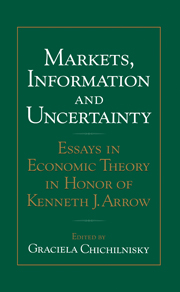Book contents
- Frontmatter
- Contents
- Preface
- List of contributors
- Section I Information and markets
- Section II Uncertainty and finance
- Section III Market externalities and justice
- 8 Moral hazard and independent income in a modern intertemporal-equilibrium model of involuntary unemployment and mandatory retirement
- 9 On the optimal schedule for introducing a new technology, when there is learning by doing
- 10 Price and market share dynamics in network industries
- 11 Exchange in a network of trading posts
- 12 Equilibrium market formation causes missing markets
- 13 Toward a general theory of social overhead capital
- 14 On population externalities and the social rate of discount
- 15 Trade and Welfare
- 16 History as a widespread externality in some Arrow–Debreu market games
- 17 Redistribution by a representative democracy and distributive justice under uncertainty
- Author index
- Subject index
10 - Price and market share dynamics in network industries
Published online by Cambridge University Press: 05 December 2011
- Frontmatter
- Contents
- Preface
- List of contributors
- Section I Information and markets
- Section II Uncertainty and finance
- Section III Market externalities and justice
- 8 Moral hazard and independent income in a modern intertemporal-equilibrium model of involuntary unemployment and mandatory retirement
- 9 On the optimal schedule for introducing a new technology, when there is learning by doing
- 10 Price and market share dynamics in network industries
- 11 Exchange in a network of trading posts
- 12 Equilibrium market formation causes missing markets
- 13 Toward a general theory of social overhead capital
- 14 On population externalities and the social rate of discount
- 15 Trade and Welfare
- 16 History as a widespread externality in some Arrow–Debreu market games
- 17 Redistribution by a representative democracy and distributive justice under uncertainty
- Author index
- Subject index
Summary
Introduction
This chapter addresses the economics of certain types of value-added networks (VANs) that are common in the financial sector and are becoming widespread in other sectors. It investigates the effect of different pricing regimes on allocative efficiency, and studies the nature of competition between vendors of these services. It emerges that there is a very strong tendency toward monopoly in VAN industries. VANs appear to be a classic case of natural monopoly, although this is not dependent on increasing returns in their technologies. The main cause is externalities between users, which lead to a “critical mass” phenomenon. A VAN is only economically viable after a certain critical mass of users is achieved. Standard prescriptions for achieving efficiency in such situations, such as marginal cost pricing and interconnection, are of limited value.
The classic example of a VAN in the financial sector is the Reuters FX monitor, a network system very widely used in trading foreign currencies by all major foreign exchange dealers. SWIFT, the international interbank communications network, is another very important example.
Reuters and SWIFT provide the infrastructure on which international capital markets run: They process transactions totaling tens of billions of dollars daily. They are to financial markets what roads and bridges are to transportation systems. Electronic mail systems, facsimile transmission networks, securities settlement networks, and electronic data interchange (EDI) networks provide further examples. VANs are also important in the travel industry. Airline reservation systems are VANs, whose strategic importance is already widely recognized in the travel business.
- Type
- Chapter
- Information
- Markets, Information and UncertaintyEssays in Economic Theory in Honor of Kenneth J. Arrow, pp. 191 - 215Publisher: Cambridge University PressPrint publication year: 1999

